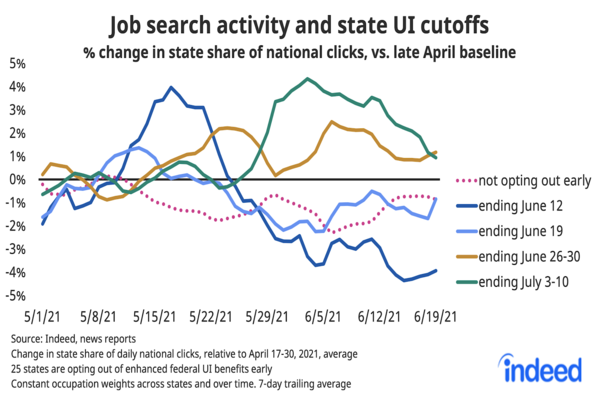So far, a dozen states have pulled out early from the federal unemployment insurance programs created in response to the coronavirus crisis, with another 14 scheduled to withdraw by the end of July. You might expect that, as a result, their residents would be rushing to find work, or at least spending a little more time clicking around online job boards than before. That was certainly the goal that Republican governors had in mind when sunsetting the benefits, which are officially scheduled to expire in September. Urged on by frustrated business owners, they argued that the generous government benefits, which added an extra $300 per week on top of normal jobless aid, were discouraging people from answering the record number of help wanted ads employers have been posting. (One Democrat, John Bel Edwards of Louisiana, has agreed to end the aid early in his state, but he did so as part of a deal securing a permanent bump in the state’s benefits starting next year.)*
Advertisement
Advertisement
Advertisement
It will likely be months before we know for sure whether cutting UI short ultimately works as intended in these states. But so far, it might not be—at least according to an analysis from Jed Kolko, the chief economist at Indeed.com’s Hiring Lab. Indeed is the country’s largest online job board. And in many of the states that are planning to end benefits early, job search activity, as measured by clicks on the site’s postings, is up a bit compared with the country as a whole. But in the 12 states that have already ended the benefits, job searches are now down, after rising a bit in May. The share of all job searches happening in states that aren’t opting out early has also dropped a bit, but not so much that UI policy would seem to be making a huge difference.
Advertisement


To be honest, I’m a little bit surprised at this chart. The argument over whether unemployment benefits have been keeping people from work, or if other factors like child care responsibilities, the lingering effects of the pandemic, and the difficulty of switching jobs are at fault, has been extremely heated. But it’s always struck me as common sense that the generous flow of government aid was having some effect. (I mean, if you talk to anybody outside of white-collar fields like journalism, the issue really does come up constantly). That’s not even necessarily a bad thing: If a program is helping people be a bit choosy as they reenter the workforce while states finally get a grip on COVID, and that drives up wages somewhat, well, there have been greater economic policy disasters in American history. But Indeed’s data suggests that UI benefits just aren’t exerting a huge influence on whether people search for jobs one way or another. The basic pattern shows a pickup in activity the month before benefits are set to expire, but then a drop-off when, if anything, you’d expect people to be searching even more furiously. It’s all just a little counterintuitive.
Advertisement
Advertisement
Perhaps workers in these states are just taking their time searching for work because they have some savings, job ads are plentiful, and as a result they still have the luxury to be picky. If so, we could see job searching hasten a bit in these states in the coming weeks and months. Or maybe this is just a quirk of Indeed’s data, and numbers from other job search sites will show different results. But for now, it’s not obvious that yanking away unemployment benefits to boost hiring is having the effect businesses have asked for. Not yet, anyway.
Correction, June 22, 2021: This piece originally misspelled Louisiana.
from WordPress https://ift.tt/3j1Mdcx
via IFTTT



No comments:
Post a Comment